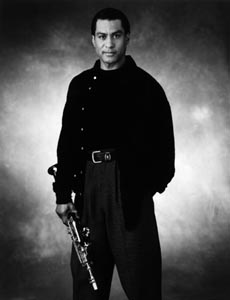Storming Quietly
Richard Petrillo
Marion Meadows makes the most of his pop-jazz groove on 'Pleasure'
By Nicky Baxter
While some lament the supposed death of modern jazz, the fact is that these days most aficionados prefer sounds they can clean house to--feel-good music. And whether one calls it pop-jazz or "quiet storm," the music must soothe and swing--however lightly--in order to get radio play.
Saxophonist Marion Meadows' new album, Pleasure (Sire), meets the above criteria. It isn't necessarily challenging, but it does manage to ease its way into your head. You find yourself humming along to the simply embellished melodies without giving them much thought.
Actually, Pleasure is as much producer Michael Bearden's project as it is Meadows.' Bearden not only wrote or co-wrote all of the album's tunes but also plays keyboards and synths. Not surprisingly, nearly all of the songs are performed in midtempo. Like other contemporary soprano saxophonists, Meadows plays soft and cozy, carefully avoiding the sometimes frenetic style Grover Washington has perfected.
Songs such as "Get Away" and "Picture This" differ only slightly in sonic vision. "Get Away" is distinguished, somewhat, by Nikki Richards' breathy, if nasal vocal. Meadows, who co-wrote the song with Beardon and Waymon Tisdale, delivers a lyrical solo that is itself bathed in sparkling keyboards, gently rhythmic guitar and unobtrusive bass.
"Picture This" is funk-lite, boasting percolating keyboards, a simple, solid drumbeat anchoring the groove and a sax line that sticks closely to the melody. Bearden offers a spidery, facile piano solo preparing the way for Meadows. Here one can detect Meadows' affinity for postclassic R&B. He'll never be confused with King Curtis, yet there is the feeling that he is striving for something beyond the clich�s that contemporary jazz usually inspire.
On "Lucky Girl," Tisdale's electric bass is showcased. Tisdale is a player of some renown, having appeared on numerous pop/jazz studio sessions. His bass alternately rumbles and sings, establishing a groove without getting stuck in it. Meadows' playing here as elsewhere is languid, doodling prettily when he's not reiterating the tune's melody.
"No Other Love" is a executed in ballad form with Marc Dorsey handling the vocal chores. Dorsey is a confident technician, his feathery touch is the perfect fit for Meadows' airy style. Overall, it is one of the album's high points.
Meadows' Pleasure won't convince hard-core jazz fans that the "quiet storm" is what improvisational music is all about, but for contempo-jazz it's not so bland.
[ San Jose | Metroactive Central | Archives ]
Copyright © Metro Publishing Inc. Maintained by Boulevards New Media.
![]()
 Sax Man: Marion Meadows
Sax Man: Marion Meadows
Web extra to the April 23-29, 1998 issue of Metro.
![[Metroactive Music]](/music/gifs/music468.gif)